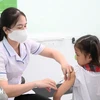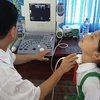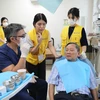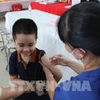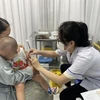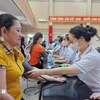Hanoi (VNA) - According to the Department of Preventive Medicine (Ministry of Health), in the first months of 2019, measles cases were constantly increasing in the world, including in countries with high measles vaccine coverage due to the rapid spread of the epidemic in groups of people who have not been vaccinated.
More than 4,600 measles cases
The latest statistics of the Department of Preventive Medicine show that, over the past six months, more than 5,600 cases of suspected measles cases nationwide have been recorded, including 1,266 cases positive to measles and zero death.
Since the beginning of the year, the country has recorded more than 27,400 cases of suspected measles, including 4,685 cases positive to measles and 1 death in Hai Duong province.
In Hanoi, according to the municipal Department of Health, in the 27th week (from July 1 to July 7), the city recorded 30 cases of measles but no deaths. Patients were distributed in 16/30 districts, 28 communes and wards.
Statistics from the beginning of the year until now show that the whole city has 2,596 cases of measles/rubella, no deaths. Patients are distributed in 30/30 districts and 483/584 communes (82 percent).
Measles sampling test rate in Hanoi reached more than 73 percent (1,897/2,596), of which the Hanoi Center for Disease Control tested 529 samples (348 samples tested positive to measles); the National Hospital of Pediatrics tested 470 samples (437 samples tested positive to measles); the Central Hospital for Tropical Diseases tested 231 samples (201 samples tested positive to measles; 02 samples tested positive to rubella).
Since the beginning of the year, the whole Hanoi city has had 1,574 cases of measles, no deaths. Patients are distributed in 30/30 districts.
Associate Professor Do Duy Cuong - Director of the Center for Tropical Diseases of Bach Mai Hospital said, in the past 6 months, the Center has recorded nearly 200 cases of adults with measles, higher than the same period in previous years.
Risk of infection from international visitors
Because of the widespread spread of measles worldwide, the World Health Organization (WHO) recommends its international passengers to prevent the spread of measles.
Measles is one of the most dangerous infectious diseases in the world, according to WHO, with a very serious risk of progression. In 2017, the year with the most recent data, measles was the cause of about 110,000 deaths. Even in high-income countries, complications account for up to a quarter of hospitalized patients and can lead to long-term consequences, from brain damage, blindness to deaf.
The initial symptom of measles is usually a high fever, which starts 10-12 days after exposure and lasts for 4-7 days. Measles patients with signs of a runny nose, coughing, red and watery eyes and small white particles inside the cheek area may appear in the early stages. After a few days, the rash starts and usually appears on the face and above the neck.
WHO statistics show that most measles-related deaths are due to complications of the disease including blindness, encephalitis, severe diarrhea, or pneumonia.
Therefore, for every citizen, the best protection against measles is two shots of measles vaccine, which is often combined with mumps and rubella vaccines.
Measles is spread by coughing and runny nose, throat, close or direct contact with the nose and throat secretions of an infected person. Within 2 hours, the virus is still active and able to infect the air or contaminated surface. Measles can be passed from person to person 4 days before to 4 days after the rash.
Children who have not been vaccinated against measles are most at risk for measles and its complications. Anyone who is not immune to measles (for example, someone who has not had 2 doses of measles vaccine) can get it.
Recent measles outbreaks clearly show gaps in the measles epidemic in children and adults.
WHO has made recommendations to passengers for the international spread of measles. All international passengers should check their immunization status to make sure they have received 2 doses of measles vaccine.
People who are not sure about the measles vaccine situation should get at least one shot of measles vaccine. The World Health Organization recommends that all passengers should be vaccinated against measles at least 15 days before departure.
Measles vaccine can be given at the same time as other vaccines such as yellow fever vaccine. All passengers should receive instructions from health officials and be aware of the risk of measles infection, transmission of measles.-VNA


